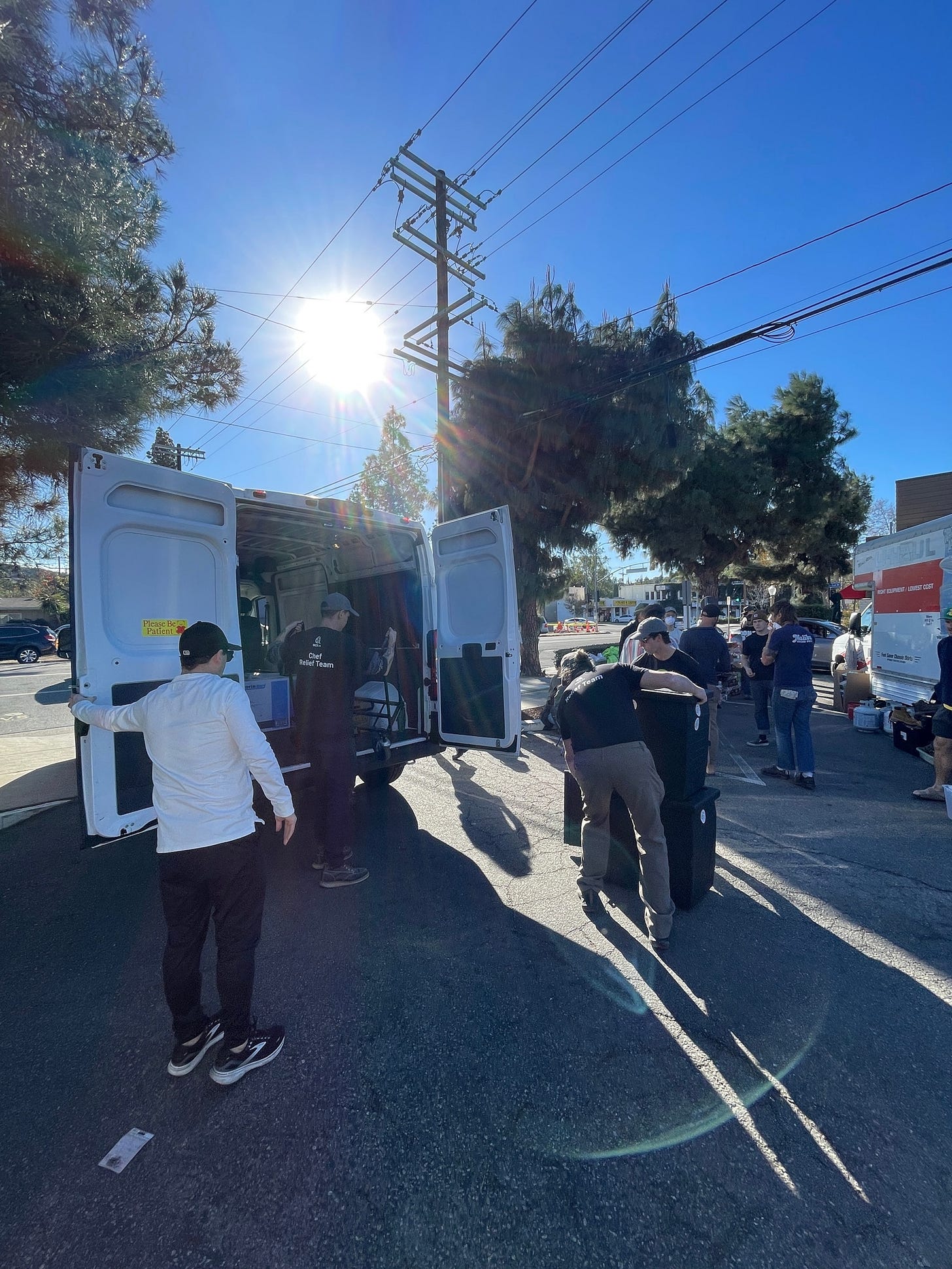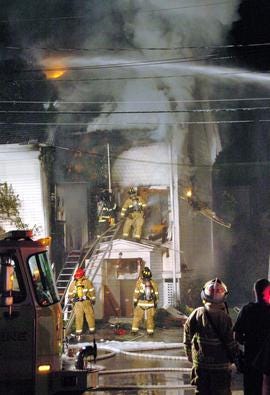Showing Up
“We were born for this moment . . . This is what we do. We show up.” — Richard Ayoub, Project Angel Food
“In the worst moments of humanity, the best of humanity always shows up.” —Jose Andres, World Central Kitchen

I do not own a television set. And anyway, I cannot stay up late enough to watch the late-night comedy shows, much as I need to laugh to keep my spirits up. I often rely on the New York Times to provide me with a “Best of Late Night” synopsis the next day, complete with links to its pick of the best monologs from the night before. Jimmy Kimmel is my favorite.
Located in Hollywood, “Jimmy Kimmel Live” was notably absent from the mix for most of the previous week for the obvious reason that Los Angeles was (and still is) busy burning down. Not only have I missed Kimmel’s voice, but I have been surprised to find myself worrying, from time to time, about the people on his show — people I do not, and probably will not ever, know personally. Were they safe?
On Tuesday morning, the New York Times included Kimmel’s monolog in its lineup once again. The show was back after having been shut down for several days. A tearful Jimmy Kimmel recounted the terror of living in Los Angeles. Kimmel managed to interject some humor into his monolog. He noted that the neighborhood around the studio is normally crawling with superheroes: “Spiderman after Spiderman.” (He showed footage of multiple people wearing Spiderman costumes and mugging for the camera outside the studio.) “And, when the fires broke out here, those heroes did nothing. They did not help us at all.”
"But then.” Jimmy Kimmel continued, “the real superheroes swooped in — the Aquamen, if you will. And I have to say, watching these pilots drop water from planes, these precision strikes . . . I could watch this all day long. From now on, this is how I want to put out all the candles on all my birthday cakes.”
Above all, his monolog was serious, and it was one of tribute and gratitude — for the firefighters, for all the many people who showed up to help, including people who had lost everything but nonetheless mustered in parking lots and public parks to hand out free food and supplies to others rendered homeless and frightened. Kimmel ended his monolog with a video montage of various people helping. Just helping. Passing the cases of bottled water. Gathering toys for kids. Providing shelter for pets made homeless. Collecting good clothing for people who had lost everything. People on the front lines cooking for others who were hungry. Helping in every possible way.
And I cried.
You know, I lived through my own small version (infinitesimal in comparison!) of this in 2011 when the church I was serving burned. In the middle of the night, at 1:20AM, the police department called me: “Reverend Stocker, I’m sorry to have to tell you this, but your church is on fire.” I know there are far worse phone calls, but believe me, you do not ever want to get a phone call like that one.
I rushed to the scene and spent the whole night standing with the Deputy Fire Chief on the sidewalk across the street from the church. When firefighters had questions about where certain doors led, they came and asked me. When they wanted to know what or where certain things were, they came and asked me. When television reporters needed an update for the upcoming news hour, they came and interviewed me. A small cluster of congregants found out about the fire in the middle of the night through various sources, and they gathered with me. Otherwise, I stood quietly and somberly. And watched the church burn, wondering what new thing had hatched in the life of my congregation and in my personal life as well.
I think the apartment building next door may have been evacuated (I am not sure). The power was definitely shut down along the street. But there were no strong winds blowing, and there was no threat of entire neighborhoods, an entire city, going up in smoke. Just our church. That alone was devastating enough. I cannot even imagine how that kind of devastation translates to an entire city.

But I will tell you this: I can imagine the helping hands Jimmy Kimmel spoke of in his monolog the other night, because I experienced something very similar. My congregation received so much help and support. Instantly. Without question.
Within hours of the fire, the rector of the Episcopal church had sent us a key to their building. “Use our space any time,” he said. “Just make sure you get on our calendar.” And we did use their space many times during the recovery and rebuilding period, starting a mere two days after the fire. Several days after the fire, a parishioner died, and the UCC church offered their sanctuary and parish hall for the funeral and reception. Over the next three years of recovery, similar assistance came from the Presbyterian church and the Catholic church. Again and again.
For the nearly three years it took for us to rebuild, the Jewish temple in the next town let us move into the building that housed their Hebrew school. They allowed us to use their space for our weekly services, choir practices, and various other activities. They gave us a dedicated room there to store all our equipment and materials in between times. They initially offered us their space long-term for free. “No,” I said. “We’ll figure out a rental fee together. For one thing, our insurance will help pay for it. For another, this will get really old for you, and we want to make sure this is fair for you.” But, their first impulse was simply to offer us shelter, no questions asked, because we were homeless.
Churches from all over the country sent us hymnals and took up collections for us. Area musicians put on concerts for us. And check after check — many from people we had never heard of — started arriving in the mail almost immediately. We were inundated by good wishes and assistance. It was humbling and heartwarming.
On the home front, friends reached out by phone, email, and letter. People brought over dinners for my husband and me. When I officiated at the wedding of some friends, they put a note about the church fire in their wedding program and told their guests how to donate to the recovery efforts. When I officiated at a memorial service for some other friends, their relatives sent our church a hefty check.
You don’t forget a trauma like the church fire easily. And you especially do not forget the love and generosity people bestow on you when they show up. At some point during the recovery and rebuilding process, I created the following slide show to accompany the song “When the UU Burned Down,” which Jud Caswell wrote about the church fire. All these years later, this slide show still makes me cry. So many memories come tumbling back, most of them of the wonderful people who stepped forward to help. I hope you will take a few moments to watch it.
When Richard Ayoud says, “This is what we do. We show up,” I suspect he is talking about his organization, Project Angel Food, in Los Angeles. According to their website, “Project Angel Food prepares and delivers more than 1.5 million medically tailored meals each year, free of charge to homes of men, women, and children affected by life-threatening illnesses.” That’s pretty impressive. But you know what? I hear his words on a much broader scale. In my experience, showing up is what people do when their hearts are stirred by compassion, love, and concern.
People, this is what we do. We show up.
Tough days are ahead for Los Angeles. The fires haven’t been extinguished yet. There are more winds to come. At some point, the trauma will end, and the healing and rebuilding will commence. People will need to show up for a long, long time going forward.
And, of course, Los Angeles is only one place of many in a world where people are in desperate need of help. People in troubled spots all over the world need others to show up. In Ukraine. In Gaza. In every region where children are hungry or afraid or both. So let us always be looking for the one good thing humanity can do. Let us find the ways we can show up.
Love,
Sylvia
P.S. Incidentally, Jimmy Kimmel mentioned two charities during his broadcast. I pass them along to you, if you are interested.
supportlafd.org supports the Los Angeles firefighters.
wck.org is the link for World Central Kitchen, a fabulous charity to which my husband and I send a large contribution every year. They are working in Los Angeles now and also all over the world.


I remember that night so clearly. (My last night as board chair of UUCB and as it turned out my first night as chair of the Recovery Committee.) But what I remember best and what always brings a lump in my throat and a tear to my eye is the morning they raised the bell back up in the new church and rang it!
😢👍💕